Helping rural teachers improve their teaching methods and enhance understanding of education concepts

FOCAL POINTS
- Rural Youth Science Ca...
09/13/2024
- Rural Education in the...
1/1/2023
- The Tin Ka Ping Founda...
12/2022
- Sanhe Library in 2021
12/02/2021
- Foreword: ESS Opens a ...
03/01/2021
- 2020 Innovative Teachi...
- 2019 Teacher Training ...
- 2019 Summer Camps for ...
- a. Science Summer Camp...
- b. Science Camps in Wu...
- c. Science Camps in Ch...
- d. Science Camps in In...
- e. Summer Camps in Hun...
- 2016 ESS Financial Aid...
- 2016 ESS Adopt A Rural...
- Taking on Three Decade...
- On Producing the ESS DVD
05/09/2009
- Improve Teaching and L...
- SERC Program Diagram
- SERC Program Results
- NBC Feature on ESS
10/19/2007
2013 ESS Basic Education Conference
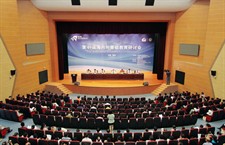 |
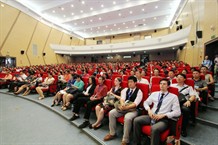 |
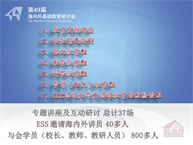 |
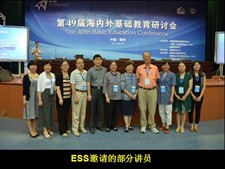 |
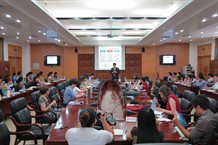 |
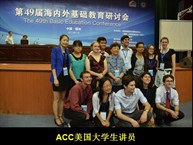 |
Go back to Basic Education Conferences
The 49th ESS Basic Education Conference was held from July 24-26, 2013 at Fujian Normal Univeristy in Fuzhou. The Conference was jointly sponsored by ESS, the Education Development Research Center (Ministry of Education, China), and the Fujian Provincial Education Bureau. Partner institutions included the Central Education Committee of the China Democratic League (CDL), the K.P. Tin Foundation in Hong Kong, and the Associated Colleges in China (ACC). More than 800 rural school teachers, principals and education research staff participated in the conference activities.
The conference aimed at introducing new concepts in education and pedagogy appropriate for the school environment in China, promoting exchange of ideas and experience among rural teachers and school principals, and helping to upgrade teaching quality in rural schools. More than 40 experts and specialists gave presentations and participated in panel discussions in the following areas:
- macro developments in education;
- principals' forum;
- teaching of language;
- teaching of mathematics;
- teaching of science; and
- early child development.
Twelve ACC students gave presentations on various topics based on their experiences with the education system in the US.
Presentations in all the sessions of the three-day conference may be downloaded from the following website of Fujian Normal University: http://jsjyxy.fjnu.edu.cn/
Feedback Analysis
Fujian Normal University conducted an analysis of a sample of the responses to the conference questionnaires, and reported that:
(1) Re topics covered in the conference: most participants were satisfied with the relevance of the subject matter to their work, and with the mode of presentation and discussion. However, many felt that time constraint had prevented some topics from being explored in greater depth.
(2) Re major areas of inadequacies: the schedule was too tight and the topics covered a wide range, leading to lack of depth in discussions; time for interaction was too short; some presentations were too theoretical; comparisons between China and the US were too general.
(3) Re presenters and lecturers: most participants were satisfied with the level of expertise of the lecturers, while some felt they could not fully understand the presentations. Presentations by Professor Daisy Hong of the Insitute of Cognitive Neuroscience (Taiwan National Central University) won the highest rating. The areas participants felt most inspired were: emphasis on developing the potential and creativity of the students; advanced ideas and concepts in education and pedagogy in other countries; and interaction with teachers in other areas in China.
(4) Re organization of the conference: most participants were happy with the logistics arrangements, and with the attitude and efficiency of the volunteer staff.
(5) Suggestions for future conferences: select more topics that are relevant to the education field in China; invite more front-line teachers in China to give presentations on practical experiences; invite students from other countries to give presentations; broaden the exchange of online information to benefit more teachers; strengthen exchange and cooperation among different countries, among different areas, and in different subject areas.

